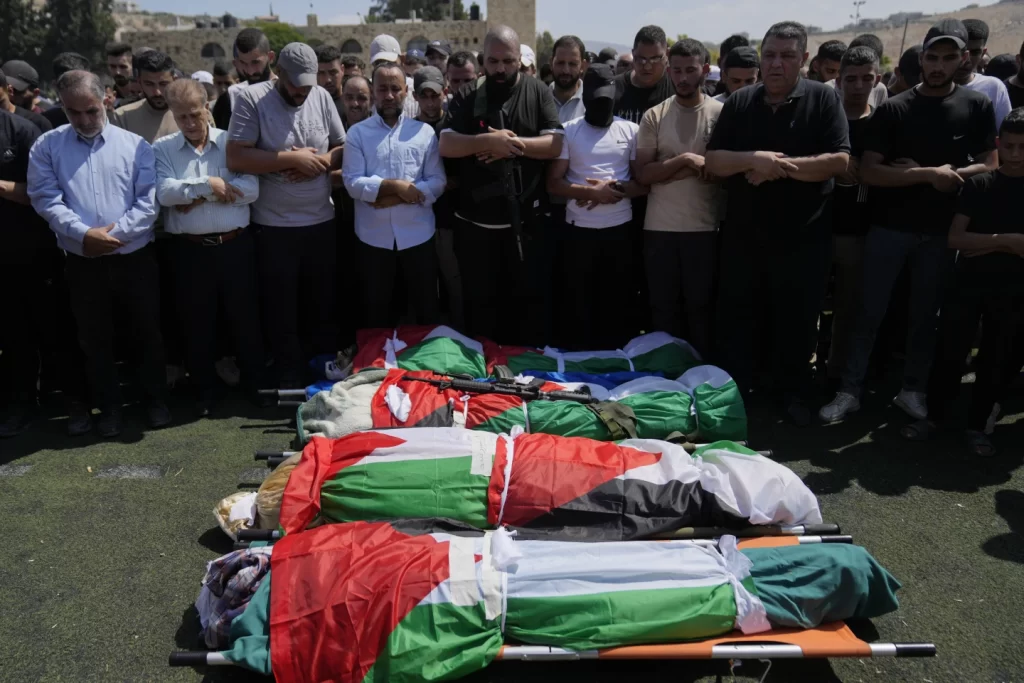Israeli forces have intensified their operations in the West Bank, killing five militants including a prominent local commander early Thursday, in what appears to be the deadliest military operation in the occupied territory since the outbreak of the Gaza war.

The Israeli military reported that Mohammed Jaber, known as Abu Shujaa, a high-ranking member of the Islamic Jihad militant group, was killed during a raid in the city of Tulkarem. Jaber had gained notoriety earlier this year when he made a surprise appearance at the funeral of other militants after being falsely reported killed in an Israeli operation.
According to the military, Jaber and four other militants were killed in a shootout with Israeli forces after taking refuge in a mosque. The Israeli military claims Jaber was linked to numerous attacks on Israelis, including a deadly shooting in June, and was planning further operations.
The operation in Tulkarem also resulted in the arrest of another militant and the light injury of a member of Israel’s paramilitary Border Police.

This latest incursion is part of a larger Israeli operation that began overnight Tuesday into Wednesday. Hamas reported that 10 of its fighters were killed in various locations, while the Palestinian Health Ministry confirmed an 11th death without specifying whether the individual was a fighter or a civilian.
The total death toll of 16 in less than two days marks this as potentially the deadliest Israeli operation in the West Bank since Hamas’ October 7 attack on Israel, which ignited the current war in Gaza.
Since the start of the Gaza conflict, the Palestinian Health Ministry reports that over 650 Palestinians have been killed in the West Bank. While many of these casualties appear to be militants killed in gunbattles during Israeli operations, there have also been civilian bystanders and protesters among the dead.
The Israeli military maintains that these operations are necessary to prevent attacks on Israeli citizens, which have also increased since the start of the war. However, Palestinians view these raids as an expansion of the Israel-Hamas conflict, aimed at perpetuating Israel’s long-standing military rule over the territory.

The raids have primarily targeted refugee camps dating back to the 1948 war surrounding Israel’s creation. Many of these camps are known militant strongholds.
In response to the escalating violence, Hamas has renewed its calls for Palestinians in the West Bank to rise up, describing the raids as part of a larger plan to expand the war in Gaza. The militant group has urged security forces loyal to the Western-backed Palestinian Authority to join what it terms the “sacred battle of our people.”
Palestinian Authority President Mahmoud Abbas has condemned the Israeli raids, but his forces are not expected to intervene.
As the situation in the West Bank intensifies, international concern grows over the expanding scope of the conflict and its impact on civilians. The United States, Qatar, and Egypt continue their efforts to mediate a ceasefire that would see the remaining hostages in Gaza released, but negotiations have repeatedly stalled.

With Israeli Prime Minister Benjamin Netanyahu vowing “total victory” over Hamas and the militant group demanding a lasting ceasefire and full Israeli withdrawal from Gaza, the prospects for a swift resolution to the conflict remain uncertain.
The ongoing violence in both Gaza and the West Bank continues to raise questions about the future of Israeli-Palestinian relations and the viability of a two-state solution, as the death toll mounts and diplomatic efforts struggle to gain traction.
AP



